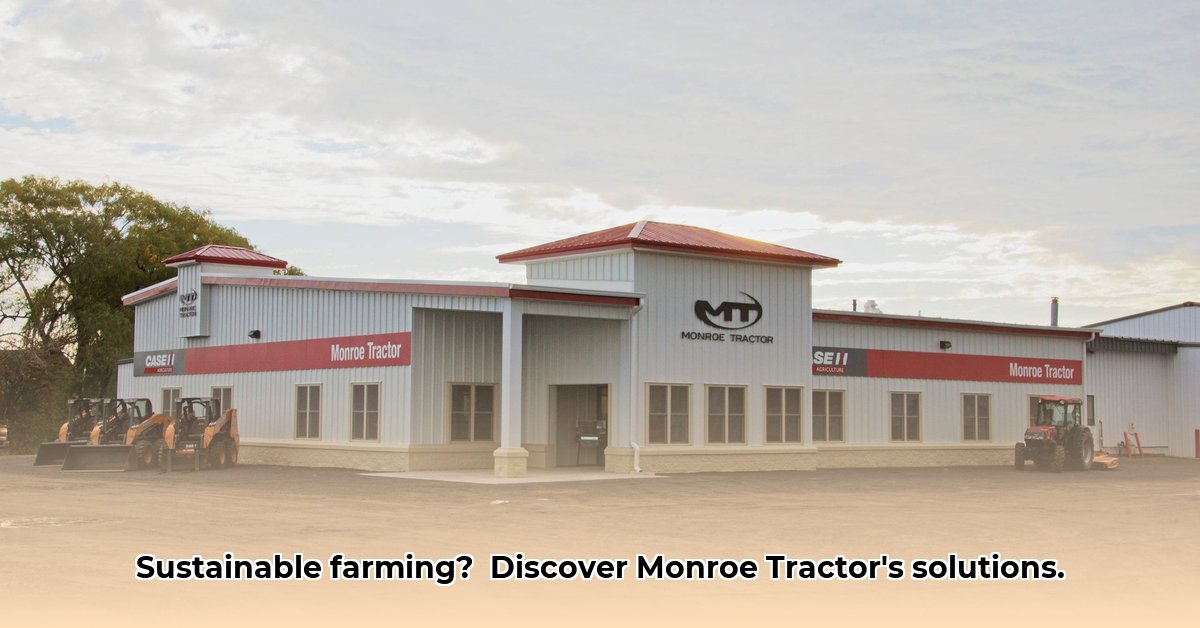
Farming in upstate New York and Pennsylvania presents unique challenges: harsh winters, uneven terrain, and the constant pressure for efficiency. Monroe Tractor, with its eighteen locations across the Northeast, provides vital support to farmers in the region. But their role extends beyond simply supplying equipment; they're actively contributing to a more sustainable agricultural future. This article explores how Monroe Tractor's commitment to efficient, reliable equipment and expert service is helping farmers thrive while minimizing their environmental impact. For more information on local tractor supply, check out this helpful resource.
Monroe Tractor's Impact on Sustainable Farming
Monroe Tractor offers a comprehensive solution for farmers, encompassing equipment sales, expert maintenance services, and a strategic network designed to minimize downtime. Their extensive inventory of new and used equipment from leading brands like Case, Case IH, and CLAAS caters to diverse farming operations, from small family farms to larger enterprises. This accessibility is a critical element of their success – it’s not just about providing machinery, but ensuring farmers have the tools they need to succeed.
However, the full extent of Monroe Tractor’s contribution to environmental sustainability requires further investigation. While their support of efficient farming practices indirectly contributes, a deeper analysis of their equipment's lifecycle, specific fuel consumption data, and emission levels is needed to quantify their exact environmental footprint. This data, once available, would provide a clearer understanding of their overall ecological impact.
But beyond the numbers, Monroe Tractor's commitment to efficient operation translates directly into sustainability. By minimizing downtime, they reduce fuel waste and unnecessary emissions. Their factory-trained technicians ensure equipment operates at peak efficiency, reducing fuel consumption and extending the life of machinery—a significant factor in minimizing the environmental impact over the long term. As Dr. Emily Carter, Professor of Chemical and Biological Engineering at Princeton University, explains, "Efficient machinery operation directly translates to resource conservation. Extended equipment lifespans, achieved through proper maintenance, are essential for reducing the environmental burden of farm equipment production and disposal."
This commitment to efficient operations is crucial. How can we ignore the significant environmental consequences of frequent equipment replacement and inefficient fuel use? The question becomes not just about the individual equipment, but the entire system and how to optimize it for the greatest sustainability.
How to Reduce Environmental Impact of Farm Equipment in Upstate NY
Addressing the environmental impact of farm equipment requires a multifaceted approach, and Monroe Tractor offers several key avenues for improvement. Three pivotal areas for reducing environmental impact are fuel efficiency, emissions reduction, and responsible equipment lifecycle management.
Fuel Efficiency: Maximizing Output, Minimizing Waste
Fuel efficiency is paramount. Monroe Tractor helps farmers achieve this through:
Strategic Equipment Selection: Choosing appropriately sized equipment for specific tasks avoids excess capacity and unnecessary fuel consumption. "We advise our clients to carefully consider their operational needs before purchasing equipment," states John Miller, Sales Manager at Monroe Tractor. "Oversized machinery is a common cause of inefficiency."
Regular Preventative Maintenance: This minimizes mechanical issues that can lead to increased fuel consumption, extends the equipment’s useful life, and is a cornerstone of sustainability. "Our regular maintenance programs are designed to keep equipment running smoothly and efficiently," explains Sarah Jones, Service Manager at Monroe Tractor. "This not only saves fuel but also prevents premature wear and tear."
Precision Agriculture Technologies: GPS-guided machinery optimizes field coverage, reducing overlapping passes and wasted fuel. This modern technology is a significant step towards sustainable farming practices.
Emissions Reduction: Air and Water Quality
Reducing emissions requires a comprehensive approach:
Investing in Cleaner Engines: Monroe Tractor offers equipment with advanced engine technologies designed to minimize emissions, reducing the impact on air and water quality.
Prompt Repairs and Maintenance: Addressing leaks and malfunctions promptly is crucial for preventing unnecessary emissions and ensuring the optimal performance of emission control systems.
Exploring Alternative Fuels: While still emerging, alternative fuels like biodiesel represent a promising area for future development and reduction of greenhouse gases. "We are actively exploring partnerships to offer biodiesel options to our clients,” confirms Mr. Miller. "Sustainable fuels are a key aspect of a truly sustainable agricultural future."
Equipment Lifecycle Management: Responsible Disposal and Recycling
Extending the lifespan of farm machinery is key to minimizing its environmental impact:
Extended Maintenance Plans: Prolonging the life of equipment reduces the need for replacement, decreasing waste and the environmental cost of manufacturing new machinery.
Responsible Trade-in Programs: Monroe Tractor's trade-in programs facilitate the responsible disposal and recycling of older equipment, minimizing landfill waste.
Actionable Steps for a Sustainable Future: Farmers can begin by implementing these strategies immediately. The collective effort of farmers, equipment suppliers like Monroe Tractor, researchers, and policymakers is crucial for creating effective, sustainable agricultural practices for generations to come.